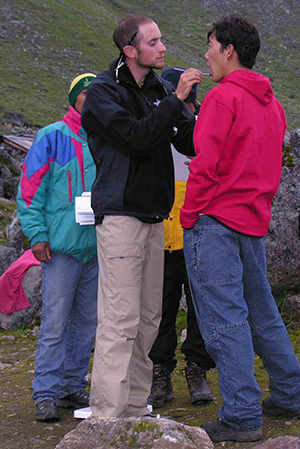A study led by the University of British Columbia calls into question a widely-used method of diagnosing acute mountain sickness.
The Lake Louise Score Questionnaire has been used for more than two decades to determine if someone was suffering from acute mountain sickness (AMS), which strikes people at high elevations (above 2,500 metres). The lack of oxygen causes a spectrum of ailments, from headaches to vomiting to potentially fatal swelling of the brain or lungs. People with severe AMS can be given extra oxygen if it’s available, but the most reliable and easiest treatment is descending to lower elevations.
The questionnaire, valued for its simplicity under austere conditions, asks people who are feeling ill at altitude to rate themselves in five areas – headache, nausea, weakness, dizziness and sleep quality. It was created at an annual conference on hypoxia (low oxygen levels) held in Lake Louise, Alberta.
A team co-directed by Michael Koehle, an Associate Professor in the Division of Sports Medicine and the School of Kinesiology, used the questionnaire on nearly 500 Nepalis who hiked to a high-altitude lake as part of a religious pilgrimage. As many as 20,000 Nepalis, most of whom live at 1,400 metres, ascend over a day or two to 4,380 metres, many of them clad only in saris and flip-flops. Nearly a third of those who completed the questionnaire were diagnosed with AMS.

Assistant Professor of Physical Therapy Jordan Guenette assesses a Nepalese pilgrim for acute mountain sickness. Photo credit: Michael Koehle
A statistical analysis of the results, published in the journal High Altitude Medicine & Biology, found that the sleep score did not coincide with the answers on the other four parts of the questionnaire. If sleep quality was removed from the questionnaire, the reliability of the overall score increased.
Including the sleep score in the questionnaire, Dr. Koehle says, could lead to some people being treated unnecessarily, and others not getting treatment they need – which is usually going back down to lower elevations.
“Although people with AMS frequently do have trouble sleeping, that symptom can be affected by many other factors, including noise, comfort and the mild dehydration that often occurs at high altitude,” Dr. Koehle says. “And while the entire questionnaire is based on a self-assessment, rating the quality of your own sleep is particularly subjective. So I would recommend removing that from the questionnaire.”
The Lake Louise Score Questionnaire asks people to rate themselves on five criteria on a scale of zero to three, with zero meaning “normal” or “good,” and three meaning “severe” (or, in the case of sleeping, “could not sleep at all”). A person must have a score of one or higher on the headache question, and an overall score of three or higher to be diagnosed with AMS. Another tool for diagnosing AMS, called the Environmental Symptom Questionnaire III (ESQ III), covers 65 measurements or symptoms, but calculating that score is difficult without a computer. The ESQ III does not consider sleep quality.
Dr. Koehle sees patients at UBC’s Allan McGavin Sports Medicine Centre, and in addition to the usual gamut of ailments and injuries – muscle and joint aches, breathing problems, concussions and fatigue – he has developed a specialty in helping people who spend time at high elevation for trekking, mining exploration (mostly in the Andes of South America), or training for athletic competition.